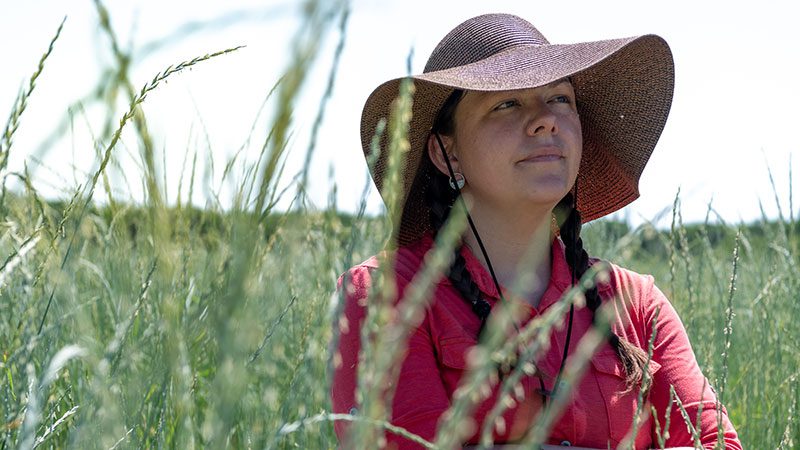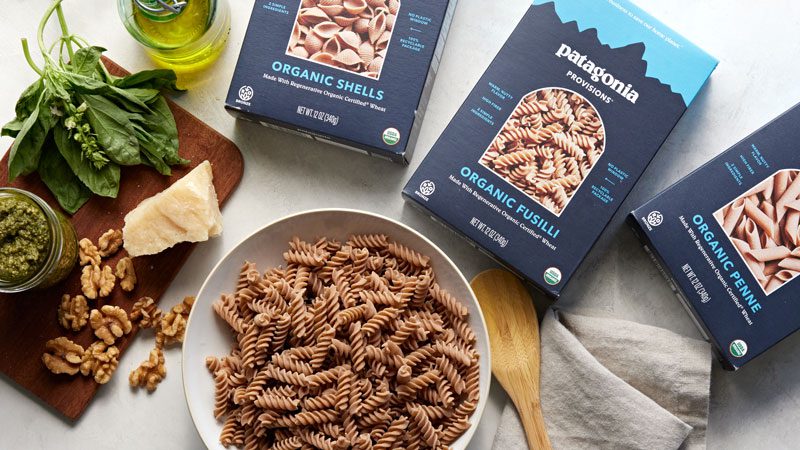Pioneering sweet, sustainable Kernza baked goods
By Rebekah Denn

If you bake it, they will come.
That’s the thinking behind a groundbreaking new line of PCC baked goods made with Kernza, a trademarked perennial grain that’s been hailed for years as a sustainable, climate-smart food. The Kernza project is launching with enticing treats at every PCC store, starting with a trio of sweet tea breads — banana, pumpkin and zucchini — plus a chocolate chip pecan cookie, a marionberry jam thumbprint cookie and a ginger oat cake. All are made with a mix of Kernza flour and Cairnspring Mills wheat flour, baked in PCC’s central kitchen in Edmonds.
“My goal was to take this really awesome, very unknown, sustainable grain and make something so delicious that consumers wouldn’t think that it was any different than any other baked good that they could buy,” said Robin Bellina, PCC’s Fresh Program Manager, who developed recipes with retail deli manager Tristan Ambrose.
The baking project is believed to be the first large-scale use of Kernza in grocery baked goods, following years of hope and challenges for the nationally known agricultural project.
“This is a perennial grain that requires no tillage. It’ll regrow for three to five years before it will need to be replanted, and the carbon sequestering superpowers are well known and documented,” said Mike Wenrick, PCC’s Director of Purpose. “What I’m looking forward to is that our customers will be such a tangible example of how their food choices positively or negatively impact the planet.”

The story of Kernza
Kernza’s story began in 1983 when plant breeders at the Rodale Institute selected the grain of an intermediate wheatgrass, Thinopyrum intermedium, as a promising perennial grain candidate, according to the Kansas-based Land Institute. The nonprofit institute has overseen the perennial grain now trademarked as Kernza since 2003.
Most grains, including wheat, must be replanted annually, requiring extra costs for everything from seeds to labor to fuel. Additionally, farmers typically till their soil for annual crops each year if they don’t follow principles of regenerative agriculture, contributing to soil erosion and poor soil health.
Kernza, by contrast, can produce grain for 3 to 5 years. Its deep roots, reaching 10 feet or more below the soil, are efficient at absorbing water and nutrients, and the institute says they can help mitigate climate change by sequestering 300 to 1,000 pounds of atmospheric carbon per acre annually in the soil. The institute cites studies that Kernza significantly lowers soil erosion and surface nutrient runoff compared to winter wheat, as well as sharply reducing nitrate levels in soil water, reducing the risk of contamination in drinking water.
A single crop isn’t a magical solution to climate concerns and world hunger. For one, Kernza isn’t as productive as traditional wheat. But researchers are working to rapidly improve its yields.
Currently, there are about 3255 acres of Kernza being farmed in the U.S., according to the latest figures from the Land Institute. That’s the tiniest of fractions compared to the more than 38 million acres dedicated to wheat.
To reach a more critical mass will require several steps — but perhaps the most important is getting it on grocery shelves and dinner plates.
“What I heard from the farmers is, we have the land, and we have the know-how, but there’s not the market,” Wenrick said. “And so if you tell us that you want it, we’ll plant it — as long as you actually buy it. That’s where (PCC) has power as a retailer, to transition land to more sustainable practices.”
Baking with Kernza
Wenrick first encountered Kernza in Long Root Ale, a “delicious” carbon-sequestering collaboration between Portland-based Hopworks Brewery and Patagonia Provisions, the sustainable food division of the outdoor clothing company. “I just remember kind of laughing to myself, that of all the things I do in my in my life, the choices I make, that being able to help the climate by drinking beer was probably my favorite,” he said.
Last year, after working on regenerative farming projects, he saw local Kernza potential at a natural foods conference after learning of a public benefit corporation’s acquisition of Timeless Seeds, known for legume farming in eastern Montana, creating new opportunities for sustainable sourcing. He returned with a bag of Kernza flour and asked Ambrose “What do you think?”
Ambrose and Bellina went to work, sourcing PCC-level quantities of the flour from Kernza currenty grown in Minnesota and milled at Cascade Milling in Royal City, WA.
“It’s got a really nice, sweet, flavor,” Bellina said. Kernza is deep-flavored with notes of malt, she found, and even tones of cinnamon. It has a high protein content and a low glycemic index.
Kernza’s properties are different enough from all-purpose flour or even whole wheat flour that it can’t simply be substituted 1:1, Ambrose noted. An 100% Kernza baked good would be too flat and dense for the treats they envisioned. They had to experiment with flavors, textures and ingredient combinations.
“I wouldn’t say it’s difficult to bake with, but there’s definitely a learning curve,” Ambrose said.
They found Kernza paired well with chocolate, and a chocolate chip-pecan cookie tested high on their list. “We were trying to get the perfect crunch on the cookie with the perfect amount of chew,” Ambrose said. Testers found it “almost magical,” Ambrose said, with echoes of toffee in a deep, rich flavor with a crisp texture that went perfectly with a cup of coffee.
Sweets with the broadest appeal were un-yeasted recipes like the cookies and tea cakes, where the Kernza blend added good flavor but didn’t substantially alter the texture. The thumbprint cookie originally had barley flour in its mix, Bellina said, but switching that out for Kernza was an sweeter, nuttier improvement. Switching Kernza in for whole wheat flour also translated well to hearty oat cakes.
Efforts to create Kernza products have flashed and sputtered over time, including a bad harvest year in 2019 that delayed a mass-market Cascadian Farms Kernza cereal. (At that time, there was a test plot of Kernza in Washington state at the original Cascadian Farms site in Rockport, then owned by General Mills, now a research farm for Rodale.)
Current shelf-stable products include several beers and several flour blends, cereal, and Patagonia Products organic pastas (carried by PCC.) While individual restaurants or bakeries have offered fresh-baked Kernza products, PCC’s endeavor is the largest yet, confirms the Land Institute. More products are in the works, including work toward a fudgy brownie.
“I think this is just the beginning of a bigger thing that’s going to happen…” Ambrose said. It fits the co-op’s mission — and it’s delicious. “This project is near and dear for us, because we love the co op and we just want to see how far we can take it.”

Talk of The Co-op and Kernza
Every month PCC features “Talk of the Co-op” products that are particularly special or unique. April’s picks feature Kernza. They are:
- PCC Tea Loaves (zucchini, banana and pumpkin) made with Kernza and local flour from Cairnspring Mills.
- Patagonia Provisions x Deschutes Brewery Non-Alcoholic Kernza Golden Brew, a crisp nonalcoholic beer.
- Patagonia Provisions Organic Pasta: Choose from fusilli, penne or shells made with just two ingredients, durum wheat flour and Kernza.
